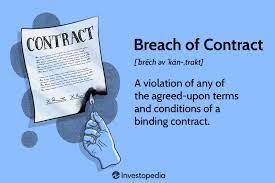Contractual Problems and Solutions
Contractual Problems
An overview of common provisions and contractual issues for organizations.
A contract is a binding agreement between two or more parties, defining the expectations of each participant. This legally enforceable arrangement should make doing business easier – however underlying issues can lead to disputes. Here are four tips to avoid getting in trouble.
Pretty much every facet of your business will require contracts of some kind. Leasing commercial space, conducting transactions of any kind, hiring people, payroll, and more all involve contracts, so you need to make sure you know how to keep things in order.
Legal Issues in Relation to the Contract
At the center of every contract is an offer or an agreement to do or not do something. This offer has all the details so the person agreeing to the contract knows exactly what they’re getting into. Intention must also be made plain and clearly defined. Those requirements may sound basic, but it actually leaves room for many kinds of transactions or potential transactions not to have coverage under the law.
Legal issues in relation to a contract arise when one or more parties fail to fulfill their obligations as outlined in the agreement. These issues can range from a simple misunderstanding or miscommunication to more serious breaches of contract that could result in significant legal consequences.
One of the most common legal issues in relation to a contract is a breach of contract. A breach of contract occurs when one party fails to perform its obligations as outlined in the agreement. This could be due to a failure to deliver goods or services on time, a failure to pay for goods or services as agreed, or any other failure to fulfill the terms of the contract.
In the event of a breach of contract, the affected party may be entitled to damages or other legal remedies. These remedies may include compensation for any losses or damages suffered as a result of the breach, or the right to terminate the contract altogether.
Another legal issue in relation to a contract is the interpretation of the agreement itself. In some cases, the terms of a contract may be ambiguous or open to interpretation. This can lead to disputes between the parties involved, and may require legal intervention to resolve.
It is important for parties entering into a contract to ensure that the terms of the agreement are clear and unambiguous. This can help to avoid any misunderstandings or disputes later on.
Other legal issues in relation to a contract may include issues related to capacity, fraud, or duress. For example, if one party enters into a contract under duress or coercion, the agreement may be deemed void or unenforceable.
In conclusion, legal issues in relation to a contract can arise for a variety of reasons. It is important for parties entering into a contract to ensure that the terms of the agreement are clear and unambiguous, and that they understand their obligations under the contract. In the event of a breach of contract or other legal issue, it may be necessary to seek legal advice or intervention to protect your rights and interests.
For example, auctioneers aren’t contractually obligated to sell items they have on auction. An auction only expresses a willingness to sell rather than an offer itself. Conversely, a bidder can revoke their offer before the contract is final without issue as long as the auction has a reserve.
Other Problems of Contract Law
Contracts can get much more complicated if there are more than two parties involved. Since the initial structure of contract law focused on the traditional two-party system, multiple parties require special attention when determining liability and responsibility. Even when the two primary parties seek to change the terms of the contract, the degree to which the third-party can intervene is often unclear.
To resolve common problems with contract law, people will often resort to third-party arbitration. Not only is the process effective, but it’s also generally cheaper than the alternatives. These arbitrators are usually experts in a field.
What is a Breach of Contract?
A business contract creates certain obligations that are to be fulfilled by the parties who entered into the agreement. Legally, one party’s failure to fulfill any of its contractual obligations is known as a “breach” of the contract. Depending on the specifics, a breach can occur when a party fails to perform on time, does not perform in accordance with the terms of the agreement, or does not perform at all. Accordingly, a breach of contract will usually be categorized as either “material” or “immaterial” for purposes of determining the appropriate legal solution or “remedy” for the breach.
Most common issues in business contracts
When you start making lots of business contracts for new customers and partnerships, it’s a sign that business is booming. The consequences of getting those contracts wrong, however, are huge.
That’s why it’s important to know the most common issues associated with business contracts, so you don’t make the same mistakes yourself. Here’s what you need to watch out for:
1) You haven’t considered what constitutes a breach
When drawing up a contract, it’s important to think about anything that might go wrong in your new business relationship and how that might be solved. For example, what if the other party doesn’t deliver a service on time? How will you resolve this? The exact details of any potential breaches should be included in your contract – considering this at an early stage also means you’ll know how to resolve any issues that do occur and the potential damage to your business will be minimised.
It’s important to consider exactly what constitutes a breach of contract so you know how to resolve it.
2) The contract doesn’t include dispute resolution provisions
Requiring a Court or Tribunal to decide how to resolve a contract conflict is very expensive. Instead, it might be a good idea to include provisions for alternative dispute resolution. This will involve getting an independent third party to help both parties come to a resolution. While parties don’t have to come to a resolution, once a mediation agreement is made it’s binding, so it’s best if both parties still have a relatively good relationship.
3) You’ve not established the relationship with other contracts
Using language that’s too broad makes for many contractual issues further down the line.
If you have several contracts with the same party, how does this new contract fit in with them? Does it supersede the others, or will it work alongside them? The exact details must be included in all the contracts.
4) The contract is too vague
Using language that’s too broad makes for many contractual issues further down the line. For example, consider the word “includes.” This can mean anything you mention in the contract, but also anything else that might not be mentioned. To be exhaustive, it’s better to use “means.”
Hiring a lawyer when writing business contracts can be a wise decision that can help you avoid costly legal disputes down the line. An experienced lawyer can review your contracts and ensure that they comply with all relevant laws and regulations, and that the terms of the agreement are clear and unambiguous.
One of the main benefits of working with a lawyer is their ability to identify potential legal issues or risks that may not be immediately apparent to someone without legal expertise. They can help you navigate complex legal requirements and ensure that your contracts are legally sound.
Additionally, a lawyer can help you negotiate the terms of the contract to ensure that your interests are protected. This may include negotiating favorable payment terms, setting clear deadlines for delivery of goods or services, or including provisions for dispute resolution.
When working with a lawyer to write your business contracts, it’s important to communicate your goals and objectives clearly. This can help your lawyer understand your needs and help you achieve your desired outcomes.
Overall, hiring a lawyer to assist with your business contracts can provide you with peace of mind and help protect your business interests. It can also help you avoid costly legal disputes that can arise from poorly drafted contracts or misunderstandings between parties.
Resolving Complexities in Contract Law: Navigating Multi-Party Dynamics
Introduction
Contract law can become increasingly intricate when multiple parties are involved. While the traditional two-party system forms the basis of contract law, the inclusion of additional parties requires careful consideration when assigning liability and responsibility. Moreover, when the two primary parties seek to modify the contract terms, the involvement of third parties often brings about ambiguity regarding their intervention. To tackle these challenges, many turn to third-party arbitration, which not only proves effective but also offers cost advantages. These arbitrators typically possess expertise in relevant fields, making them valuable contributors to dispute resolution processes.
Understanding the Challenges of Multi-Party Contracts
- Liability Distribution and Responsibility Allocation
In multi-party contracts, determining the allocation of liability and the distribution of responsibilities can be intricate. Unlike the well-established framework for two-party agreements, the involvement of additional parties necessitates a thorough assessment of each party’s obligations and potential legal consequences. This complexity arises due to the need to consider the unique contributions, commitments, and relationships of multiple stakeholders.
- Modifications and Third-Party Intervention
When the original contracting parties decide to amend the terms of the agreement in a multi-party scenario, the role and extent of third-party intervention can become uncertain. While the primary parties may seek to alter certain provisions, the involvement of additional stakeholders raises questions about their rights, influence, and potential impact on the revised terms. Clear guidelines and mechanisms are required to address this issue and ensure a smooth negotiation process.
Resorting to Third-Party Arbitration: An Effective Solution
Third-party arbitration emerges as a widely utilized method for resolving common challenges associated with multi-party contracts. This approach offers several advantages, making it an appealing choice for dispute resolution:
- Expertise and Neutrality
Third-party arbitrators often possess specialized knowledge and expertise in the relevant field. Their understanding of the industry’s intricacies enables them to grasp complex contractual matters and make well-informed decisions. Furthermore, these arbitrators maintain neutrality, ensuring an unbiased assessment of the contract and the parties involved.
- Cost-Effectiveness
Compared to alternative dispute resolution methods, third-party arbitration is generally more cost-effective. The expenses associated with lengthy court proceedings and litigation can be significantly reduced when parties choose arbitration. This affordability allows for a more accessible resolution process, particularly for smaller entities or individuals with limited resources.
- Confidentiality and Efficiency
Arbitration provides a confidential and efficient platform for resolving disputes. Parties can avoid the public scrutiny and disclosure of sensitive information that may occur in court cases. Moreover, arbitration processes are often streamlined, allowing for quicker resolutions and minimizing disruptions to the ongoing business operations of the involved parties.























1 comment
Author
The success of construction lenders, owners, contractors or subcontractors may depend on how well each of them addresses project risks. This is called “risk management.” A major part of risk management is “risk allocation,” whereby a party assigns by contract the responsibility for a certain risk to another party, who will then bear that risk.